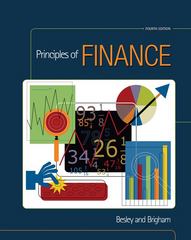Question
T/F: Banks that are insured by the Federal Deposit Insurance Corporation (FDIC) are also regulated by the FDIC. T/F: Shortly after the Reigle-Neal Act was
T/F: Banks that are insured by the Federal Deposit Insurance Corporation (FDIC) are also regulated by the FDIC.
T/F: Shortly after the Reigle-Neal Act was passed, many interstate banks divided their operations so that their branches reported to the state subsidiaries rather than to the main holding company.
T/F: The single most common cause of bank failure is inadequate capital.
T/F: An ideal solution to react to a large failing bank would prevent a run on deposits of other large banks, yet not reward a poorly performing bank with a bailout.
T/F: The International Banking Act required foreign banks to identify one state as their home state so that they would be regulated like other U.S.-based banks residing in that state.
Which of the following entities would not be involved in the regulation of a national, FDIC-insured commercial bank?
a. state agencies of the state in which the bank is located
b. FDIC
c. Comptroller of the Currency
d. Federal Reserve
e. All of these choices are involved in the regulation of a national, FDIC-insured commercial bank.
Which of the following statements is not true with respect to the regulation of bank capital?
a. Minimum capital requirements were imposed on U.S. banks in 1981 by three different regulatory agencies.
b. In 1988, the central banks of 12 countries agreed to uniform capital requirements.
c. In current capital requirements, assets are weighted according to risk.
d. Banks are subject to capital requirements, which force them to maintain a maximum amount of capital (or equity) as a percentage of total assets.
e. All of these choices are true.
Which of the following statements is not true with respect to the proposed Basel II Accord?
a. The Accord provides for an alternative method of calculating credit risk in the form of the internal ratings-based (IRB) approach.
b. The Basel Committee defines operational risk as the risk of losses resulting from inadequate or failed internal processes or systems.
c. Basel II should encourage banks to use more aggressive management.
d. Basel II provides an incentive for banks to reduce their operational risk.
Which of the following operations of commercial banks is not regulated in any form?
a. the provision of securities services
b. the provision of insurance services
c. loans
d. investment in securities
e. All of these choices are regulated in some form.
Banks with a composite CAMELS rating of ________ or ________ are considered to be problem banks.
a. 3; lower
b. 4; lower
c. 3; higher
d. 4; higher
e. None of these choices are correct.
Which of the following is not a corrective action taken by regulators when a bank is identified as a problem bank?
a. Regulators can require that additional financial information be periodically updated to allow continued monitoring.
b. Regulators may examine such banks frequently and thoroughly.
c. Regulators have the authority to take legal action against a problem bank if the bank does not comply with their suggested remedies.
d. Regulators may request that a bank boost its capital level or delay its plans to expand.
e. All of these choices are possible corrective actions taken by bank regulators.
Which of the following is not a provision of the Federal Deposit Insurance Corporation Improvement Act (FDICIA) of 1991?
a. Regulators are required to act more quickly in forcing banks with inadequate capital to correct the deficiencies.
b. Deposit insurance premiums were to be based on the risk of banks, rather than on the traditional fixed rate.
c. Commercial banks were prevented from engaging in interstate acquisitions of banks by bank holding companies.
d. Deposits exceeding the insured limit ($100,000) are not to be covered when a bank fails.
e. All of these choices are provisions of the FDICIA.
Which of the following is not true with respect to government rescues of failing commercial banks?
a. A federal government bailout can be expensive.
b. If the federal government rescues a large bank, it sends a message to the banking industry that large banks will not be allowed to fail.
c. If other large banks are financially sound, a false rumor will usually not increase depositors' worries and will not cause a run on deposits.
d. Just a deregulation can enhance efficiency, government intervention could reduce efficiency.
e. All of these choices are true.
Which of the following is least likely to have contributed to uniform global banking regulations?
a. the Glass-Steagall Act
b. the International Banking Act
c. the Single European Act
d. the uniform capital adequacy guidelines
Which of the following is incorrect with respect to the Sarbanes-Oxley Act?
a. Bank executives are now more accountable for a bank's financial statement because they must personally verify the accuracy of the statements.
b. Banks must speed the process by which all departments and all subsidiaries have access to the data that they need.
c. Banks must implement a system that automatically checks data for unusual discrepancies relative to norms.
d. All of these choices are true with respect to the Sarbanes-Oxley Act.
Step by Step Solution
There are 3 Steps involved in it
Step: 1

Get Instant Access to Expert-Tailored Solutions
See step-by-step solutions with expert insights and AI powered tools for academic success
Step: 2

Step: 3

Ace Your Homework with AI
Get the answers you need in no time with our AI-driven, step-by-step assistance
Get Started


